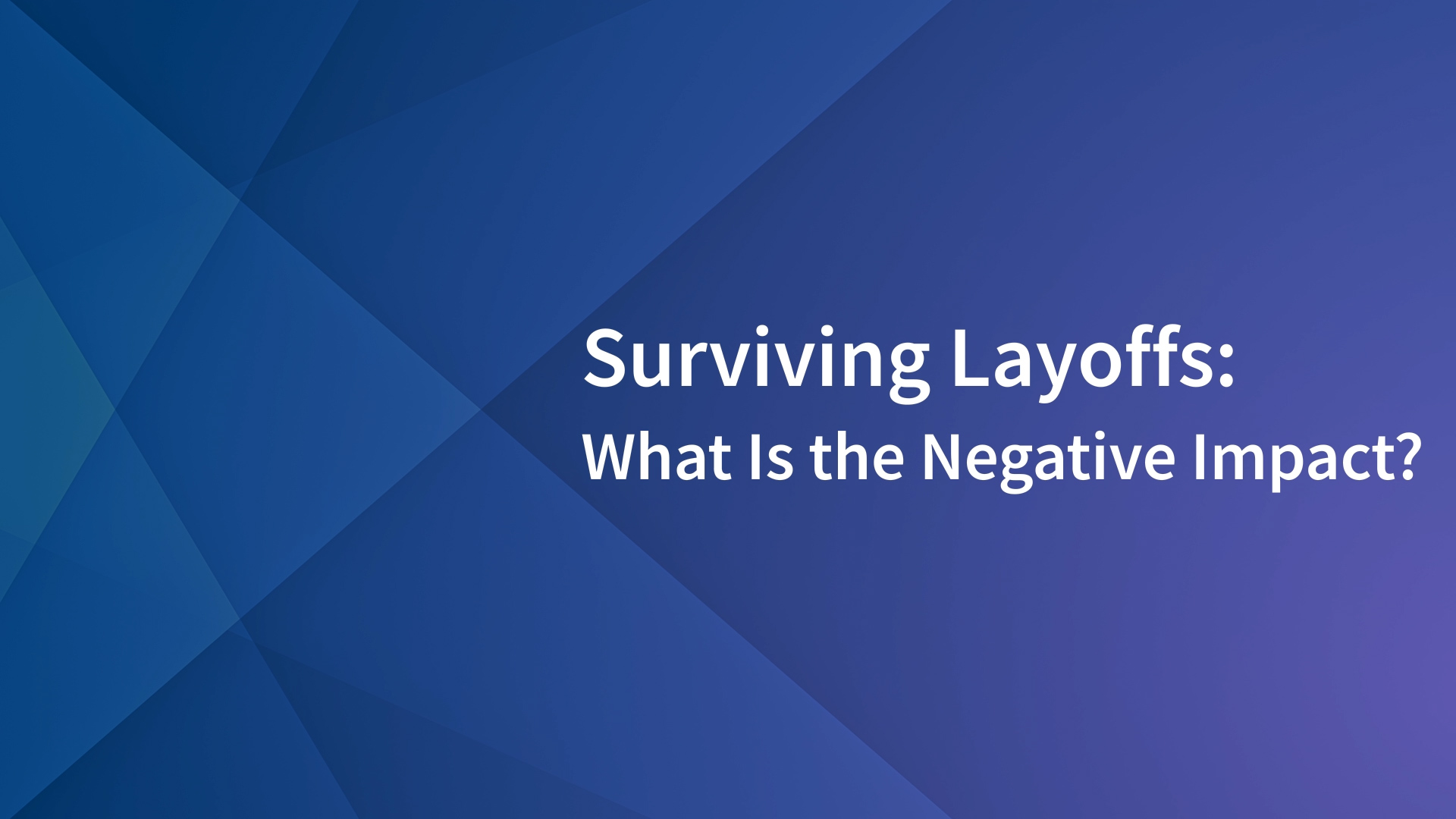Heather Myers, Ph.D., continues our five-part video series on how companies should support employees surviving layoffs by diving into the negative effects and their impact on them.
Learn 3 practical steps to mitigate the impact of layoffs in the third part of the series here.
ICYMI, Heather introduced the series here.
Watch the full series here.
Transcript:
Hi, my name's Heather Myers, and I'm the Chief Psychology Officer at Traitify.
I'd like to welcome you today to the second video in our series on helping organizations survive layoffs.
Today, we'll talk about what organizations need to understand in advance about the potential impact that layoffs can have on the remaining staff.
Both laboratory and field research show that layoffs impact emotional and physical well-being of employees, as well as the work performance of these employees post layoffs.
So what are some of the impacts on employee well-being that are felt post layoffs?
Well, employees who survive layoffs report feeling increased anxiety and fear. And these feelings are not unfounded, as 70% of companies that have layoffs will do so again within a year. So employees are afraid of losing their jobs. They’re afraid of having a job now, but that there will be more layoffs and that they too will lose their positions.
In addition, they’re also afraid of being overworked. As positions get eliminated and people get laid off, that work still exists and must be distributed among the remaining employees. And so these employees are very worried about being overworked and stressed out post layoffs.
In addition, they feel guilty. So the concept of survivor’s guilt has also been applied to people who survive layoffs. Contrary to popular belief these people don't just feel lucky to still have a job. They feel guilty, of course, for having a job when their colleagues have been fired, but they also feel resentful and sad every time they have to go to work and their friends and their colleagues aren't there and they have more work to do. They often report feeling mistrusting of management post layoffs, worried about the decisions that management has made and not agreeing with them and being mistrustful of them in general.
In addition to these impacts to psychological health and well-being, these employees also report a lack of sleep. And a lack of sleep can also lead to negative mood and also physical effects like an increased likelihood of becoming sick and having an illness of some sort.
And so how do all of these things impact the work performance of these employees?
Some evidence does suggest the insecure workers will increase the quantity of work that they produce for the short term. However, the quality of their work doesn’t increase. In fact, evidence suggests that it decreases.
These employees report that their motivation deteriorates, and that they're more likely to have an absence -- a sudden absence from work -- either because they're sick or because they're just emotionally stressed out and they feel like they can’t go into work right then. They also report having less commitment to the organization.
When asked about what they think of the organization as a whole post layoffs, the remaining employees often say that they feel like the quality of the organization itself as a whole has gone down after the layoffs. And that in particular their customer service has deteriorated, often because they don't feel there are enough people to really meet all of the demands that the customers have.
So given all of these negative impacts that layoffs can have, in the next video I'll discuss some steps that organizations can take before and during layoffs to mitigate some of these negative impacts.
In the meantime, can you think of things that your organization has done if they've experienced layoffs or procedures that they’ve put in place to try to mitigate impacts such as the ones I've described here?
Thank you for listening and I'll see you again soon.
To learn how to survive layoffs by leveraging fast, visual-based assessments, connect with Traitify.
Sources:
- Brockner, J., Davy, J., & Carter, C. (1985). Layoffs, self-esteem, and survivor guilt: Motivational, affective, and attitudinal consequences. Organizational Behavior and Human Decision Processes, 36(2), 229–244. https://doi.org/10.1016/0749-5978(85)90014-7
- Brockner, J., Greenberg, J., Brockner, A., Bortz, J., Davy, J., & Carter, C. (1986). Layoffs, Equity Theory, and Work Performance: Further Evidence of the Impact of Survivor Guilt. Academy of Management Journal, 29(2), 373–384. https://doi.org/10.5465/256193
- Campbell-jamison, F., Worrall, L., & Cooper, C. (2001). Downsizing in Britain and its effects on survivors and their organizations. Anxiety, Stress & Coping, 14(1), 35–58. https://doi.org/10.1080/10615800108248347
- Murphy, M. (2015). Don’t Expect Layoff Survivors to be Grateful. Leadership IQ. https://www.leadershipiq.com/blogs/leadershipiq/29062401-dont-expect-layoff-survivors-to-be-grateful
- Murphy, M. (2019, October 21). How To Help Your Employees Overcome Survivor Guilt After A Layoff. Forbes. https://www.forbes.com/sites/markmurphy/2019/10/22/how-to-help-your-employees-overcome-survivor-guilt-after-a-layoff/#52b201e92edf
- Wolfe, H. (2004). Survivor Syndrome: Key Considerations and Practical Steps. Institute for Employment Studies. https://www.employment-studies.co.uk/system/files/resources/files/mp28.pdf





